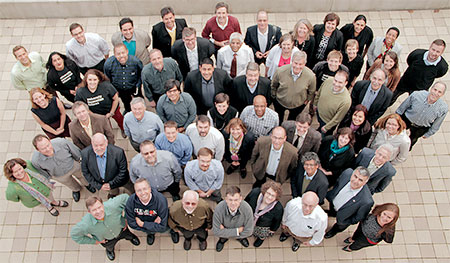Need more information? Contact us
 Click to enlargeThe University of Alabama at Birmingham is one of 25 U.S. institutions to be selected by the NSF-funded National Center for Engineering Pathways to Innovation, or Epicenter, to join the Pathways to Innovation Program.
Click to enlargeThe University of Alabama at Birmingham is one of 25 U.S. institutions to be selected by the NSF-funded National Center for Engineering Pathways to Innovation, or Epicenter, to join the Pathways to Innovation Program.
The Pathways to Innovation Program is designed to help institutions fully incorporate innovation and entrepreneurship into undergraduate engineering education. The program is run by Epicenter, which is funded by the National Science Foundation and directed by Stanford University and VentureWell.
“Pathways is a good fit for UAB’s new universitywide entrepreneurial push centered around the UAB Institute for Innovation and Entrepreneurship,” said Iwan Alexander, Ph.D., dean of the School of Engineering. “We are committed to bringing experiential learning opportunities to our students and ensure our students are exposed to realistic scenarios so that they can understand what it means to innovate, appreciate the benefits of collaboration, and develop and apply the skills they will need to meet engineering challenges of the 21st century.”
UAB’s Pathways team co-leaders are Alan Eberhardt, Ph.D., School of Engineering associate dean, and Molly Wasko, Ph.D., Collat School of Business associate professor and chair of the Department of Management, Information Systems and Quantitative Methods.
“I am excited about the possibilities this brings, as we are actively involved in developing programs in partnership with the Collat School of Business that will provide mechanisms for students to continue as innovators and become potential entrepreneurs,” Eberhardt said.
| “We are committed to bringing experiential learning opportunities to our students and ensure our students are exposed to realistic scenarios so that they can understand what it means to innovate, appreciate the benefits of collaboration, and develop and apply the skills they will need to meet engineering challenges of the 21st century.” |
“Here at UAB, Business and Engineering have already made some significant progress toward this goal, such as the biomedical engineering capstone experience that teams business and engineering students and the Innovation Boot Camp hosted at McWane Science Center. We want to take these early successes and create systemic transformation that becomes part of the UAB undergraduate experience that clearly differentiates our programs,” Wasko said. “By partnering together, we are able to leverage the unique resources and programs from both schools to create a truly interdisciplinary experience for students and faculty.”
Faculty and administrators participating in Epicenter’s Pathways program are taking on the challenge of maintaining America’s global competitiveness through ongoing innovation and are leading their universities into a new era of engineering education that prepares students to tackle big problems and thrive in this ever-changing economy.
“There are 500,000 students in the United States majoring in engineering and computer science fields,” said Tom Byers, director and co-principal investigator of Epicenter and professor at Stanford University. “These students are expected to enter industry with technical knowledge as well as a diverse set of skills and attitudes that help them to innovate, collaborate and create value. As educators, we need to better prepare this generation of students for the workforce and position them for success in their careers.”
The following universities were selected for the 2015 Pathways program:
- Case Western Reserve University
- Clemson University
- Colorado School of Mines
- Florida Institute of Technology
- Hampton University
- Illinois Institute of Technology
- James Madison University
- Loyola University Maryland
- Missouri University of Science & Technology
- New York Institute of Technology
- North Carolina A&T
- Oregon State University
- Southern Methodist University
- Temple University
- Universidad del Turabo
- University of Alabama at Birmingham
- University of Delaware
- University of Hawaii at Manoa
- University of Nebraska–Lincoln
- University of North Dakota
- University of Puerto Rico–Mayaguez
- University of Texas–Arlington
- University of Texas–El Paso
- Washington State University
- Wichita State University
Participating schools assemble a team of faculty and academic leaders to assess their institution’s current offerings, design a unique strategy for change, and lead their peers in a two-year transformation process.
Program teams receive access to models for integrating entrepreneurship into engineering curriculum, custom online resources, guidance from a community of engineering and entrepreneurship faculty, and membership in a national network of schools with similar goals.
The schools in the new cohort join an inaugural group of 12 institutions that have participated in the program since January 2014. Their projects include innovation certificates and majors, first-year and capstone courses, faculty fellows programs, and innovation centers. Additionally, several cross-institutional collaborations have resulted from the first group of schools.
“Our first group of Pathways schools have already made an enormous impact on the undergraduate engineering students at those institutions,” said Liz Nilsen, a Pathways program manager and senior program officer at VentureWell. “These new schools joining Pathways have equally ambitious aspirations. Having the experience of the first group to help guide them will accelerate the impact of their efforts.”
Leaders from each Pathways team met at Stanford University on Jan. 14. A second meeting will bring together teams of faculty and administrators from each school in Phoenix, Arizona, Feb. 16-18, to analyze the opportunities at their schools and develop plans for transforming the undergraduate engineering experience.
Learn more about the Pathways to Innovation Program at epicenter.stanford.edu/pathways-to-innovation.